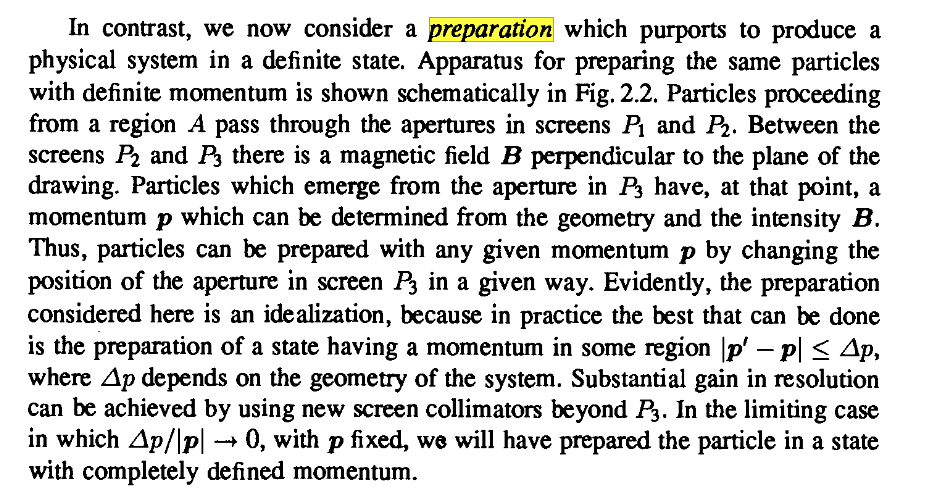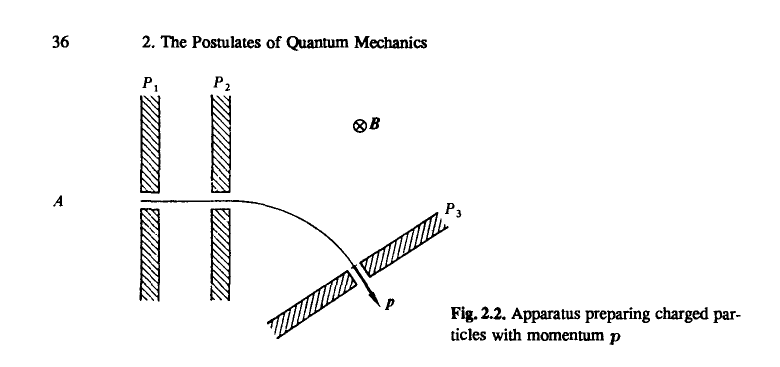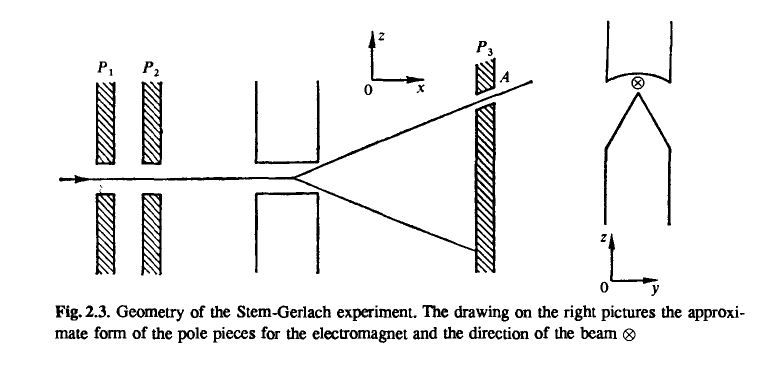-
Posts
4785 -
Joined
-
Days Won
55
Content Type
Profiles
Forums
Events
Everything posted by joigus
-
OK. To be more precise. It shouldn't be about observation. I should be about interaction. Let me put it this way: It is as much about observation as it is about interaction. There's no reason to think observation cannot be understood in terms of interaction. The very reason --whatever it might be-- that we still have to say "when we observe, measure, interact with... the particle, it goes this way" is a sympton that even though everything works for all practical purposes, there is something we would like to understand better. Some of us, anyway.
-
And a koala is also called "koala bear" even though it has nothing to do with bears. It's a marsupial. That would lead us into the fascinating world of misnomers. The loss of coherence that connects the quantum domain with the classical domain has to do with interaction, not with the observation of anything. There are planets out there that nobody will ever visit, and electrons, protons, etc, are doing their business giving rise to physics that a potential observer would interpret as classical, because they are in the classical or quasi-classical regime. Again, it's not about observing, it's about quasi-classical interactions. Ok. I have no doubt now you've picked this up from somewhere, so I've been looking it up. A minority of people seem to use that distinction "passive" vs "active". Not that it has aroused much interest at all. It seems to come from D. H. Zeh in connection with the Everett interpretation. The rest of the community doesn't seem to be paying much attention to it. I'm certainly not. I don't find such distinction useful. It's only people paying heed to the many-worlds (or relative-state) interpretation of QM that seem to find it necessary. And, then again, not all of them. You should. The interaction Hamiltonian depending on the coordinates of the apparatus had better commute with the observable it's measuring. Otherwise it's just smearing things out. If it does, it can't change the statistical weights. If it doesn't... I've reviewed this over and over and over... And over. And what's inescapable is that it doesn't change the weights (the diagonal elements of the density matrix). But it does change (and how!) the non-diagonal elements of it. And guess how we call the non-diagonal elements of the density matrix. Yes, you guessed it. "Coherences". And that's no misnomer: It contains all the possible interference terms. If the interaction is "classical enough" (the mechanical action of order many times \( \hbar \) ), then the interference terms die out in ridiculously short times. So yes, in these cases the apparatus does something on the quantum system. And viceversa. But it's very different to telling us anything like probability of cat dead = 1 and probability of cat alive = 0. Superpositions should live forever. Now, there's a series of paths you can take from there, but I'm afraid they all involve some kind of semantic orgy I'm not willing to get involved in: Pick your alternative (many-worlds, double solution, transactional,...) and adhere to the litany the "natives" use. Not for me. I prefer to say, "I don't know". Amen to that. Except the bit about "observation". Ditto. Measurement in the formalism of QM selects a basis, not a state from that basis. I disagree. There are better alternatives, but they haven't been considered nearly as seriously as they deserve. But that's my view.
-
One of the good things about having these discussions online is that nobody will end up too wet. Please substantiate How much maths am I allowed to use? Schematically coherence in a state is a precise match between 2 alternatives embodying distinguishable results (mutually orthogonal): ψ1 and ψ2 . These states being coherent means that there is a very steady correlation between their oscillatory states. IOW, they oscillate in phase. These states usually involve preparation and can be mathematically represented by a linear superposition \( \psi=\) ψ1+ψ2. Before the rest of the universe interacts with our \( \psi \)-system, we can represent the situation by a wave function \( \left( \psi_{1}+\psi_{2} \right) \times \Phi \), \( \Phi \) representing the quantum state of the rest of the universe. When this system interacts with the rest of the universe so as to record what the microsystem \( \psi \) is doing, broadly speaking what happens is that the rest of the universe (environment, measuring apparatus, any friends watching it all, etc) records it by means of some macroscopic recording states \( \Phi_{1} \) \( \Phi_{2} \) while getting entangled with the quantum system: \( \psi_{1}\Phi_{1}+\psi_{2}\Phi_{2} \). These states are suposed to be semi-classical at some level of amplification, which means that while all this is happening, they oscillate in a crazy way so that the different components of the microscopic wave function can no longer "read" each other's phase. Please substantiate! when does it and when does it not! Preparations do not involve decoherence. You just filter the state that you want, and the salient state has certain controlled values of their physical parameters. Typically it involves momentum and/or spin: (from Galindo&Pascual, Quantum Mechanics I, a book I do not recommend to learn quantum mechanics, and has probably been outdated.) I hope that helped,
-
-
OK. Thanks very much. Again, one thing I've noticed is people spending considerable time explaining how they interpret this interpretation. You, for example, introduce distinctions like observers playing "a passive role", as opposed --I assume-- to an active role. Now, I don't know what that means, or how is that supposed to be a part of the physics of it. I don't know how to include that in the Schrödinger equation either. Perhaps you mean the quantum system doing something on the apparatus, but the apparatus is doing nothing on the quantum system? You go on to remind me that it's not that we need observers, but that we are observers. Well, again you seem to insist on the old misguided concept of observing, as if it were some kind of distinct physical influence. Never mind "needed" or "existing" (inevitable). I suspect it has to do with your distinction active/passive. But we know it should not be about observing anything; unless it can be explained in terms of interacting with the system in a certain way (a way that involves decoherence between the salient components of the state). These components involve a perfect correlation between certain macroscopic states and their corresponding "measured" microscopic states. If you are happy with physics providing you conditional probabilities (in the quantum version, conditional amplitudes), then it's ok. Quantum mechanics is linear and unitary. The combination of both aspects gives you, quite unambigously, a macroscopic universe that is "contaminated" of splitting alternatives. What, in the mathematics of it, tells me I am the observer that sees one (and not the other)? In other words, what physical variable is the one that tells me I'm in one of the components of the relative state that speaks of conditional probabilities? You can ask this question over and over to people who abide by this interpretation, or any one of the manifold versions of it, and all you hear is what to me sounds like "let's not talk about that". That's why I'm not totally satisfied. Are you?
-
You can't split up a proton in the usual sense, as a proton is a bound state of quantum chromodynamics, and its "constituents" (quarks and gluons) cannot fly apart as such, but only form further particles. But they weren't in the proton before the collision, and some of them are similar to the proton itself. It's said that quarks are confined. So it's kinda like as if you try to split up a PC and, as a result, you get a bigger PC, a laptop, and a tablet. Those are not "parts" of what was there before. As to how much energy you need, the minimum is the rest energy of the particles you want to produce. If you want to split the quarks apart the answer is easier: infinite energy.
-
I was just quoting you: You seem to be interpreting an interpretation. I understand your predicament. It's not easy to make sense of it in your mind. In your answer it seems clear that you invoke the observer in order to distinguish the alternative that comes out of the measurement: But why do many observers agree upon the same alternative having been realised? Why do these multiple observers all get split into the same "congruence of observers" seeing the same thing? Why do you need an observer? I don't see any strawman in showing dissatisfaction with that state of affairs. I'm not aware that the many-worlds interpretation (orthogonal worlds interpretation if you'd rather call it that way) has made much progress in any direction except to ease the minds of some of the uncomfortable ones. Oh, don't worry, all the observers that disagree with us all have gone into an orthogonal alternative congruence of observers. I'm still uncomfortable, perhaps that's all I can say. Along with the confession that perhaps I haven't interpreted something essential in that interpretation either.
-
The problem, to me, is that we have to spend time discussing how to interpret an interpretation. The least an interpretation should be asked to do is to dispell any need to interpret the interpretation. Also, personal views should be not necessary.
-
Thank you. Yes, I'm familiar with it but it's not falsifiable, so I don't consider it an explanation of what I want to understand. Invoking a new universe every time a leaf makes a ripple on a pond is what I would call an ad hoc explanation.
-
Right. I missed that one. Would you care to elaborate, please?
-
With pleasure. As an appetizer, https://en.wikipedia.org/wiki/Mathematical_formulation_of_quantum_mechanics#Effect_of_measurement_on_the_state This, of course, is not a projection, although it involves one. A projection is linear, and the denominator couldn't be farther from linearity in \( \left|\psi\right\rangle \). If we dismiss the denominator, interpreting it as some kind of ad hoc convention (more epistemic than embodying actual physics), then \( P_{n}\left|\psi\right\rangle \) is not unitary. So the result of postulate II.c cannot be the result of any approximation in the interaction term from the Schrödinger equation (the Hamiltonian). It just can't. That's why people today don't admit to II.c reflecting in any way the actual physics. If we did, we would have to admit that is beyond physics (consciousness, or what may have you.)
-
The brain is but one particular physical system riddled with decoherence. Why would we need a brain to explain, eg, the formation of the Solar System about 4.7 billion years ago? That is but another particular example of a physical system riddled with decoherence, to be sure. Physicists of Bohr's generation, and Wigner, and so on, were very confused by the postulate of projection. That's why they invoked consciousness. Nobody plays that game anymore.
-
Who said consciousness? I mean, besides you, of course.
-
I just knew that was the direction you were going. I remember many discussions with philosophers, and I had a deja vu. But I didn't want to bring it up until you stated it clearly. You inquiry is not about colour. It's about qualia --or should be. Philosophy really. https://plato.stanford.edu/entries/qualia/
-
I did. I also remember an episode on Frasier using the same idea. Very interesting narrative idea back in the day.
-
In anticipated response to, Measurement not always involves interaction. Not always involves decoherence. When it does, it is irreversible. I'd say that almost every measurement that your brain is performing by watching what's going on in the room, involves decoherence. Some people are happy with the description of the wave function being irreversibly entangled with the rest of the universe. You can lead a happy life thinking that and never do anything wrong as concerns physics. I'm one of the people who isn't. I need to understand what happened to the rest of the amplitude that "collapsed". Some people do.
-
Sorry, not new, but much much better formulated. To account for some kind of stratification in taxa, which is what your rough idea seems to be about: https://www.sciencedirect.com/topics/earth-and-planetary-sciences/punctuated-equilibrium#:~:text=“Punctuated equilibrium is the idea,by intermittent bursts of activity.” Gradual, of course, is not absurd. We see it all the time. We see it in the bones, in the teeth, and so on. The "substance" you're looking for is, perhaps, alternative splicing. Or at least that's what some of those clueless scientists seem to have guessed at: https://www.nature.com/articles/nrg2776 Introns develop long, long before they are used against the environment. Most of these introns are lost, because they are no use. Every so-and-so many tens of millions of years, one of these intron rarities, happens to be useful for a specific environmentally-related purpose. When this extremely rare event happens, it manifests in the fossil record looking so similar to a miracle that only an expert could tell the difference. That's why having super-redundant eukaryote DNA is such a blessing in evolutionary terms.
-
What you call "the act of measurement", although I prefer a less exalted term: "interaction with the detector". To be more precise: An interaction that is amplified, so that the carrier of the piece of information "the particle was detected here" is a collectivity of quantum particles, each one with its own particular quantum phase, all of them decohering and making the entire universe decohere with respect to the teeny tiny coherent quantum state that you prepared. You can explain this with entanglement with the rest of the universe. It can be explained away in terms of entanglement. But not a two-particle entanglement. It's a super-dooper super mega entanglement with millions and billions of thermal states. That entanglement, if you will.
-

Seeking Clarification on VAT Calculation
joigus replied to Kiwn Jey's topic in Analysis and Calculus
100% of 200 plus 25% of 200 is 250 There's no reason why 100% of 250 minus 25% of 250 should produce 200 They are %'s of different quantities. Goverments and oligopolies sometimes use these maths to raise the prices a little more than it would appear to people untrained in maths. (1.01)10 is more than 1.1 (it's 1.1046), so ten increases of 1% increase more than 1 increase of 10% -

Dynamic Gravity theory to explain dark matter, cosmic ray energy, etc.
joigus replied to kba's topic in Speculations
Falacy: 1) Mainstream people think everything is OK with current state of physics 2) I have a new theory 3) Something new is found Conclusion: I was right. See any of the tens, probably hundreds of ways in which that reasoning could go wrong? Starting with 1) and 2) being blatantly false... -
No. It seems to be a fantasy. No. It should have a clear empirical content, or at least be possible to relate to such empirical content by the theory. Your formulae do neither. You might want to take a look at this: https://plato.stanford.edu/entries/operationalism/ So it's not just about writing nice equations that satisfy my sense of what this or that should be.
-
A cautionary tally: (from https://en.wikipedia.org/wiki/Alternatives_to_general_relativity) I guess what I'm saying is, what are the chances? What are the chances that anyone --thinking from intuition plus a bunch of elementary maths-- comes up with something not seen already by one of these people or partially equivalent to it? The battlefield is littered with the corpses of theories. First order of business should be: Get a rough idea of the map of different directions these alternatives are trying to extend GR into. You don't have to be a master mathematician. But the art of approximations is a must. And, yes. The algebra is wrong. In particular, your definition of force is unit-dependent. And your acceleration should be (time)-1 dimensional. When m goes to infinity your "force" goes to 1? What does that even mean?
-
Today I learned about the Leidenfrost effect. Thanks to Swansont. Now I understand my frying pan a little better.
-
Ultimately, either Galilean or Lorentz invariance is a salient fact from experiment, of course.
-
I agree. There is nothing forcing F=F' a priori. We must be told how the force changes under the transformations. It is no coincidence that all basic forces depend on the differences of the coordinates (invariance under translations), they do it through the gradient of a potential-energy which is a scalar under rotations (so F rotates covariantly as an SO(3) vector) and the force law does not depend on higher time derivatives of the coordinates. In fact, if you study in depth what kind of velocity dependence you can have in the law of force, curiously enough, the answer is the Lorentz force: vxB, where B is a vector field. Only a small class of force laws gives you consistency with Galilean relativity.




